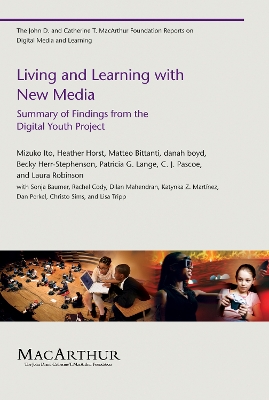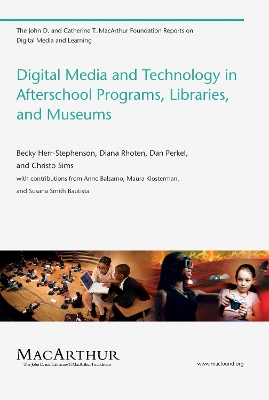The John D. and Catherine T. MacArthur Foundation Reports on Digital Media and Learning
2 total works
Living and Learning with New Media
by Mizuko Ito, Heather A. Horst, Matteo Bittanti, danah boyd, Becky Herr Stephenson, Patricia G Lange, C J Pascoe, and Laura Robinson
This report summarizes the results of an ambitious three-year ethnographic study, funded by the John D. and Catherine T. MacArthur Foundation, into how young people are living and learning with new media in varied settings-at home, in after school programs, and in online spaces. It offers a condensed version of a longer treatment provided in the book Hanging Out, Messing Around, and Geeking Out (MIT Press, 2009). The authors present empirical data on new media in the lives of American youth in order to reflect upon the relationship between new media and learning. In one of the largest qualitative and ethnographic studies of American youth culture, the authors view the relationship of youth and new media not simply in terms of technology trends but situated within the broader structural conditions of childhood and the negotiations with adults that frame the experience of youth in the United States.
The book that this report summarizes was written as a collaborative effort by members of the Digital Youth Project, a three-year research effort funded by the John D. and Catherine T. MacArthur Foundation and conducted at the University of California, Berkeley, and the University of Southern California.
John D. and Catherine T. MacArthur Reports on Digital Media and Learning
Digital Media and Technology in Afterschool Programs, Libraries, and Museums
by Becky Herr Stephenson, Diana Rhoten, Dan Perkel, and Christo Sims
An investigation of how three kinds of youth organizations have integrated digital practices into their programs.
Digital media and technology have become culturally and economically powerful parts of contemporary middle-class American childhoods. Immersed in various forms of digital media as well as mobile and Web-based technologies, young people today appear to develop knowledge and skills through participation in media. This MacArthur Report examines the ways in which afterschool programs, libraries, and museums use digital media to support extracurricular learning. It investigates how these three varieties of youth-serving organizations have incorporated technological infrastructure and digital practices into their programs; what types of participation and learning digital practices support; and how research in digital media and learning can contribute to better integration of technology within and across these organizations. The authors review a range of programs (including the long-running Computer Clubhouse movement, established in 1993 in partnership with MIT's Media Lab), and then use the idea of "media ecologies" to investigate the role that digital media play (or could play) in these "intermediary spaces for learning." They call for less anecdotal, more empirical and methodologically sound studies to help us understand the affordances of digital media for learning within and across these programs; for research focused on the relationship between digital media and the effectiveness of youth-serving organizations; and for further study of schools within childhood media ecologies.

